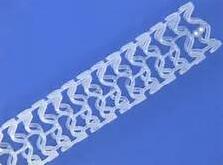
Recently, Food and Drug Administration (FDA) approved the first fully bioresorbable stent for coronary artery disease treatment. The stent, developed by Abbott and named Absorb GT1 BVS (Bioresorbable vascular scaffolds system), can release everolimus to limit the growth of scar tissues which can be fully absorbed by human body within approximately 3 years.
Absorb GT1 BVS is made of a biodegradable polymer (poly-L-lactic acid), which is similar to materials for manufacturing of other similar absorbable medical equipment material (such as suture). In vivo, Absorb GT1 BVS will be absorbed by body gradually, only 4 very small residual platinum markers left in the arterial wall for doctors to identify the original location of the Absorb GT1 BSV. Data from clinical investigation all around the world show that Absorb Bioresorbable Stent and the industry-leading metal stent—Abbott Xience-eluting stent have comparable short term and mid-term prognosis. The approval of Absorb GT1 BVS in U.S. was based on a critical random ABSORB III study data. The study enrolled 2008 patients, and incidence of MACE of Absorb GT1 BVS and drug-eluting metal stent was compared. The data of one year follow-up after stenting showed that Absorb group has similar incidence of MACE (including cardiac disease related death) with metal stent group (7.8% vs 6.1%), but slightly higher incidence of in-stent thrombosis than metal stent group (1.54% vs 0.74%).
